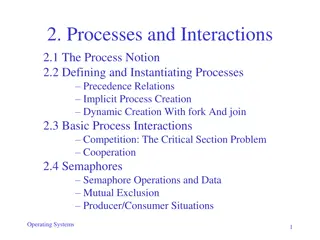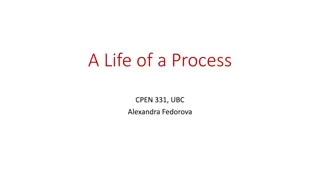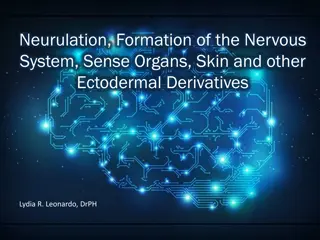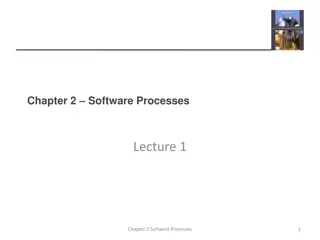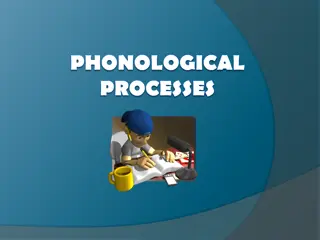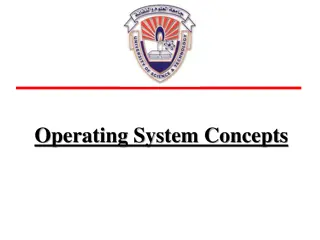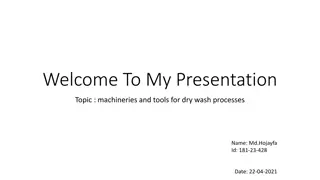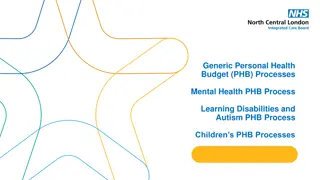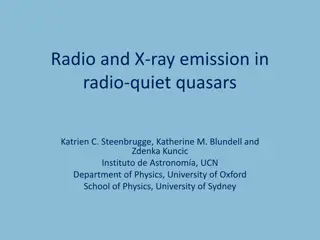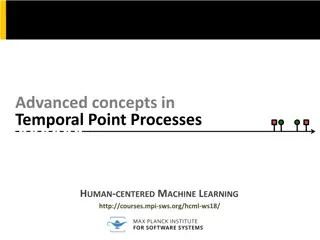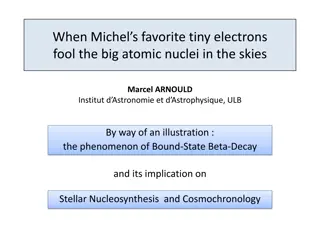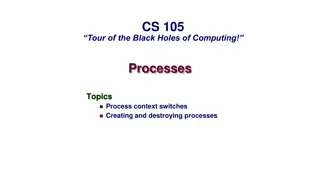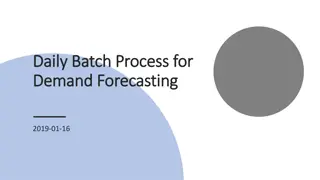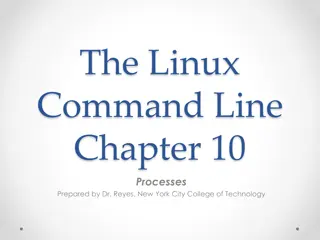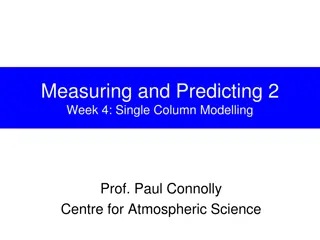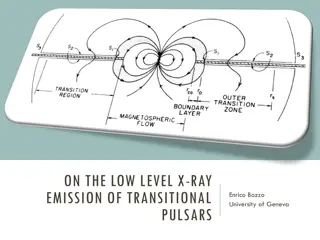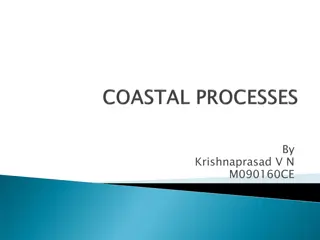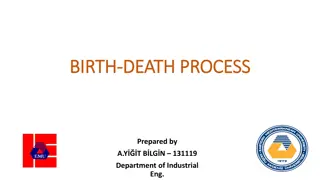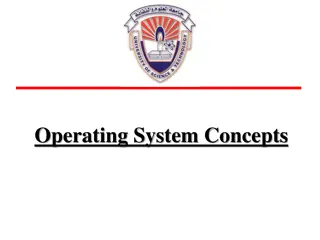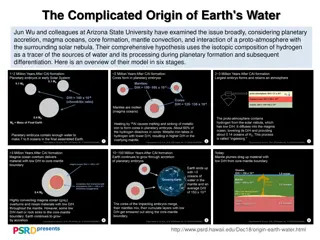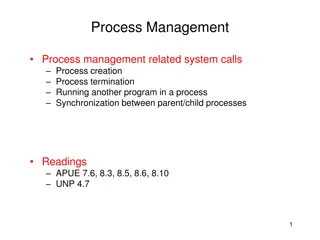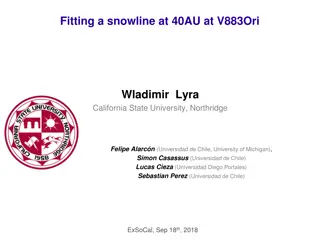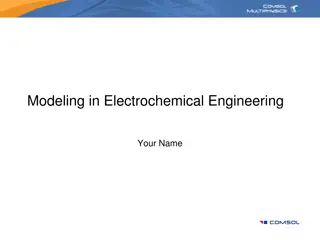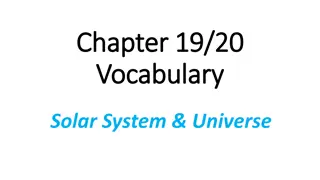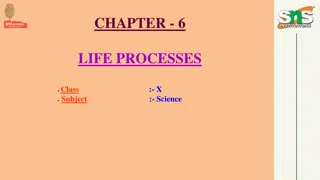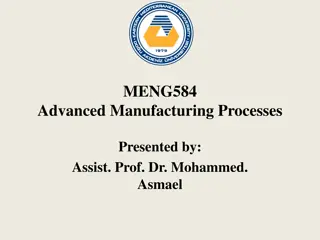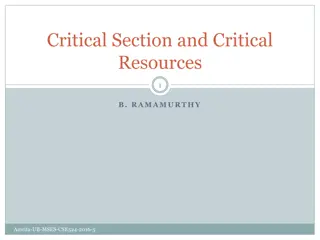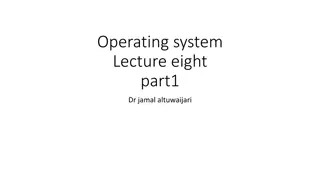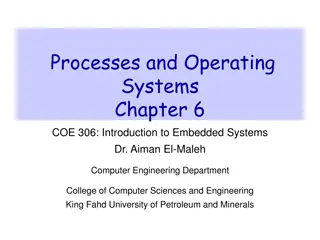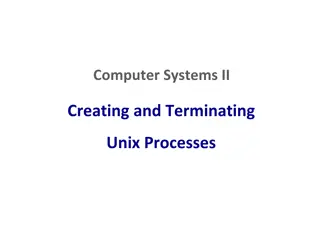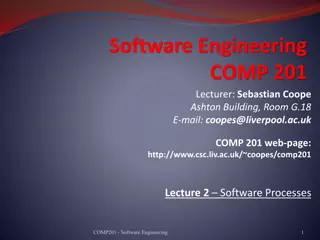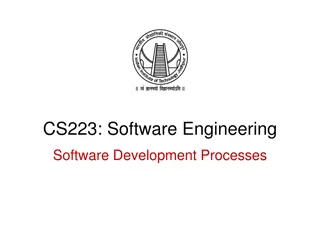Processes and Interactions
Processes in operating systems involve executing programs on CPUs, with each process having its own CPU. Processes run concurrently and can cooperate or compete for resources. Defining, creating, and managing processes is crucial for system efficiency and performance. Precedence relations, semaphore
1 views • 38 slides
A Life of a Process
This content delves into the creation and management of processes in operating systems, covering concepts such as forking processes, process states, address space management, copying processes, and key functions involved in process handling. It provides insights on constructing processes from scratc
0 views • 35 slides
Embryonic Development: Key Processes and Organization
Embryonic development involves neurulation, organogenesis, and morphogenetic processes that shape the nervous system, sense organs, skin, and other ectodermal derivatives. The embryo undergoes allocation and differentiation processes, influenced by epigenetic events and the action of organizers. Emb
2 views • 25 slides
Understanding Coastal Processes and Erosion
Coasts are dynamic environments shaped by a variety of processes such as erosion and transportation. Waves influence the size and energy of waves, while erosion is caused by processes like corrasion and solution. Coastal transportation involves suspension, solution, and saltation. The impact of mari
6 views • 18 slides
Understanding Software Processes and Models
Software processes are structured activities essential for software system development, involving specification, design, validation, and evolution. Various process models and approaches like the Rational Unified Process and agile methods are discussed, highlighting the importance of adaptability in
1 views • 105 slides
Understanding Phonological Processes in English Language
Phonological processes involve changes in linguistic sounds over time, impacting language fluency and oral production significantly. EFL students can benefit from knowledge of these processes, like linking, gemination, elision, metathesis, assimilation, haplology, and coalescence, to enhance their l
0 views • 17 slides
Advanced Treatment Processes for Faecal Sludge Management
Treatment processes for faecal sludge management involve various stages including preliminary treatment, primary treatment, secondary treatment, and tertiary treatment. Each stage employs mechanical, biological, and chemical processes to separate, decompose, and remove contaminants from the sludge,
0 views • 7 slides
Understanding CPU Scheduling in Operating Systems
In a single-processor system, processes take turns running on the CPU. The goal of multiprogramming is to keep the CPU busy at all times. CPU scheduling relies on the alternating CPU and I/O burst cycles of processes. The CPU scheduler selects processes from the ready queue to execute when the CPU i
0 views • 26 slides
Understanding Renewal Processes in Continuous Time
Renewal theory is a branch of probability theory that extends Poisson processes for various inter-arrival times. A renewal process models randomly occurring events over time, such as customer arrivals at a service station or natural phenomena like earthquakes. This article delves into the concept of
0 views • 20 slides
Machineries and Tools for Dry Wash Processes in Garment Industry
Garment washing plays a vital role in enhancing the appearance and quality of textiles. This presentation by Md. Hojayfa delves into the machineries and tools utilized in the dry wash processes of the garment industry. It covers the machines used in washing plants, the objectives of washing, dry pro
1 views • 7 slides
Generic Personal Health Budget (PHB) Processes Overview
This slide deck provides a guide on how to set up, manage, and monitor Personal Health Budgets (PHBs) in various service areas. It covers processes for setting up PHBs, commissioning external care, changing delivery methods, and monitoring money management. The focus is on mental health, learning di
0 views • 17 slides
Insights into Radio and X-ray Emission in Radio-Quiet Quasars
Radio galaxies are categorized as radio-loud or radio-quiet based on the presence of jets and lobes. Unlike radio-loud quasars, the nuclear radio emission in radio-quiet quasars does not originate from large-scale jets. Possible explanations include broad absorption lines, magnetically accelerated e
0 views • 15 slides
Understanding Advanced Concepts in Temporal Point Processes for Human-Centered Machine Learning
Explore advanced concepts in temporal point processes through the lens of human-centered machine learning. Topics include marked temporal point processes, independent identically distributed marks, dependent marks, and mutually exciting marks. Learn about stochastic dynamical systems such as the Sus
0 views • 8 slides
Understanding Nuclear Decays and Reactions in Stellar Astrophysics
Nuclear decays and reactions, driven by weak interactions, are vital in stellar astrophysics. Various processes like bound-state beta-decay impact nucleosynthesis and cosmochronology. Specific processes in stars involve capture reactions, electron capture, and neutrino-nucleus interactions. Stellar
0 views • 22 slides
Understanding Processes and Multiprocessing in Computing
Processes in computing provide the illusion of exclusive CPU and memory use for each program through logical control flow and address space management. Multiprocessing allows a computer to run multiple processes simultaneously, catering to various user applications. This concept challenges the tradi
0 views • 39 slides
Daily Batch Process for Demand Forecasting - Roadmap and Import Actions
In this data workflow, a roadmap is prepared for batch processes related to demand forecasting. It includes steps for uploading and importing data into Anaplan, SQL sources, EBS processes, and various file imports. The script names and processes are outlined with caution against renaming data hub pr
0 views • 14 slides
Understanding Programs and Processes in Operating Systems
Exploring the fundamental concepts of programs and processes in operating systems, this content delves into the definitions of programs and processes, the relationship between them, the components of a program, what is added by a process, and how processes are created. The role of DLLs, mapped files
0 views • 22 slides
Understanding Linux Processes and Controlling Them
This content provides insights into Linux processes, including parent-child relationships, process management commands like ps and top, background jobs, bringing processes to the foreground, and terminating processes. It also covers killing processes using kill and killall commands.
0 views • 7 slides
Understanding Cloud and Precipitation Processes in Atmospheric Science
This week's module focuses on measuring, predicting, and modeling single-column processes related to clouds and precipitation. Topics covered include ODE and PDE models, advection equations, orographic clouds, warm and cold cloud processes, condensation, warm-rain processes, and more. The importance
0 views • 17 slides
Low-level X-ray Emission of Transitional Pulsars
Delve into the intriguing realm of transitional pulsars emitting low-level X-rays, exploring unique phenomena like pulsations at unprecedentedly low X-ray luminosities, the influence of accretion processes and propeller effects, and potential solutions involving outflows and the location of the magn
0 views • 17 slides
Understanding Coastal Processes: Erosion, Deposition, and Human Impact
Coastal processes involve a complex interplay of erosion, deposition, and human activities that impact the dynamic equilibrium of coastlines. Energy from tides, waves, wind, and currents shape the land-water interface, while human use of coasts introduces conflicts leading to unstable systems. Sedim
0 views • 44 slides
Phonetic Processes Exercises for Linguistics Students
Practice identifying phonetic processes such as stridency deletion, stopping, fronting, and more with exercises involving target words. Determine which processes apply to various words and mark the likely processes for specific targets. Enhance your understanding of substitution processes in linguis
0 views • 5 slides
Pure Birth Processes in Industrial Engineering
Birth-death processes, Yule-Furry models, and pure birth processes are discussed in the context of industrial engineering. The study of evolutionary processes, population dynamics, and radioactive transmutations are explored through mathematical models and examples. The concept of state transitions
0 views • 19 slides
Interprocess Communication in Operating Systems
In operating systems, processes may execute independently or cooperatively, affecting or being affected by other processes. Interprocess communication allows processes to share data and information for reasons like information sharing, computation speedup, modularity, and convenience. There are two
0 views • 22 slides
Land Mass Change Along the Bangladesh Coastline Study
The study examines land mass changes along the vulnerable Bangladesh coastline due to climate change impacts. Data from 1973 to 2015 shows erosion and accretion rates in different districts, highlighting the dynamic nature of the coastal region. GIS technology is utilized to analyze and visualize th
0 views • 15 slides
The Complicated Formation of Earth's Water: A Detailed Overview
Jun Wu and colleagues at Arizona State University have developed a comprehensive model to explain the origin of Earth's water through stages such as planetary accretion, core formation, and interactions with the solar nebula. By tracing the isotopic composition of hydrogen, they explore how water so
0 views • 7 slides
Importance of a BDC Binder in Documenting Processes
Documenting processes in your BDC using a BDC Binder is crucial to ensure knowledge transfer, especially during turnover. A BDC Binder can be a physical or digital folder used for training and daily operations, containing information like tool logins, call scripts, appointment processes, and dealers
0 views • 8 slides
Understanding Process Management in Computer Systems
Exploring the concepts of process management in computer systems, including process creation, termination, running programs, synchronization between processes, and the components involved in managing processes such as memory, CPU, files, and devices. The importance of processes in sharing system res
0 views • 22 slides
Exploration of Snowline Dynamics in V883 Orionis System
Investigating the snowline position at 40 AU in the V883 Orionis protostellar system reveals insights into the accretion processes and heating mechanisms. Various studies analyze the properties of V883 Ori, its disk, and potential triggers for FU Ori outbursts. Observations highlight the signature o
0 views • 17 slides
Understanding Electrochemical Systems and Processes
Electrochemical engineering involves the study of devices and processes that convert chemical energy to electrical energy through ionic conductors. This field explores redox reactions, energy-producing processes, electrocatalysis, anodic and cathodic reactions, and the interplay between thermochemic
0 views • 25 slides
Exploring the Solar System and Universe: Vocabulary Overview
Explore key terms related to the Solar System and Universe, including concepts such as accretion, asteroids, the Big Bang Theory, black holes, clusters, comets, galaxies, light-years, nebulae, the Nebular Model, planets, and red giants. Enhance your understanding of these phenomena and their signifi
0 views • 19 slides
Life Processes: Criteria for Living Things and Basic Processes in Organisms
Living things are characterized by movement and specific life processes like nutrition, respiration, transportation, and excretion. Nutrition involves obtaining and utilizing food for energy and growth. There are two main modes of nutrition: autotrophic and heterotrophic. Heterotrophic nutrition inc
0 views • 33 slides
Advanced Manufacturing Processes Overview
The course MENG584 focuses on advanced manufacturing processes including traditional and nontraditional machining techniques. Material removal processes, machining accuracy, and surface finish considerations are highlighted. Various machining methods such as cutting, abrasion, thermal, chemical, and
0 views • 24 slides
Managing Critical Resources in Concurrent Processes
Concurrent processes can enhance performance but require careful handling of critical resources to prevent inconsistency. Utilizing semaphores for mutual exclusion and synchronization can help control access to shared resources. This article discusses the principles of concurrency, issues with inter
0 views • 18 slides
Comprehensive Overview of Peace Processes and the Role of Women and Girls
Peace processes involve a variety of formal and informal activities, with the participation of different actors such as international organizations, grassroots movements, and individuals. Formal peace processes include conflict prevention, peace-building, and disarmament, while informal activities e
0 views • 12 slides
Understanding Asynchronous and Concurrent Processes in Operating Systems
Exploring the concepts of asynchronous and concurrent processes in operating systems, this lecture covers how processes can function independently or require occasional synchronization. It also delves into parallel processing complexities, control structures for indicating parallelism, precedence gr
0 views • 14 slides
Introduction to Processes and Operating Systems in Embedded Systems
Processes and operating systems play a crucial role in building complex applications on microprocessors, offering flexibility to meet timing requirements. The operating system (OS) manages processes by providing mechanisms for switching execution between them. Real-Time Operating Systems (RTOS) are
0 views • 65 slides
Understanding Unix Process Management in Computer Systems II
This overview delves into the creation, termination, memory layout, and dynamic memory management of Unix processes in Computer Systems II. It covers the distinctions between code, executables, and processes, the memory layout of Unix processes, management of heap memory using malloc and free functi
0 views • 27 slides
Understanding Software Engineering Processes
Dive into the world of software engineering processes through a comprehensive exploration of building development processes, tasks involved, and the characteristics of a process. Discover how these processes ensure systematic software development and the key steps required for successful project com
0 views • 33 slides
Understanding Software Engineering and Development Processes
Explore the key concepts of software engineering, including misconceptions, legacy software, and development phases. Learn about professional responsibilities, the need for software processes, the ETVX model, and different properties of software processes. Discover the components of software process
0 views • 57 slides
